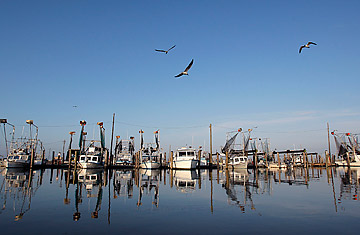
Idle shrimp boats float at the docks of Joshua's Marina in Buras, La.
(2 of 2)
The government has insisted repeatedly that BP will pay all the costs of the cleanup and all damages as well — and Washington seems willing to push the oil company as far as it can. But there will surely be limits. President Obama has said that he will push BP to compensate rig workers who have been laid off because of the six-month moratorium on deepwater drilling he instituted to fix the industry's safety standards, but there's skepticism that claim could hold. As BP comes under greater pressure politically in Washington, a backlash is beginning to build in Britain, especially over the question of whether BP will be able to make billions in expected dividend payments to shareholders even as the spill is continuing. "I do think it starts to become a matter of national concern if a great British company is being continually beaten up on international airwaves," London Mayor Boris Johnson told the BBC Thursday.
As the spill worsens, though, the pressure will only increase — and a new scientific estimate of the leak rate shows that Gulf catastrophe could be even worse than we ever imagined. After reviewing better video from the underwater leak, the government's Flow Rate Technical Group estimated on Thursday that the oil was escaping at a rate between 20,000 bbl. and 40,000 bbl. a day, and that was before robots severed the broken riser at the wellhead a week ago, which may have increased the flow by as much as another 20%. That's up from an earlier estimate of between 12,000 bbl. and 19,000 bbl., and an initial number of about 5,000 bbl. a day, though some independent scientists were arguing weeks ago that the flow was far higher than that. And it's still not certain. "Our scientific analysis is still a work in progress," said U.S. geological-survey director Marcia McNutt, the head of the flow-rate team. "In coming days we'll be refining our estimates further.
The total amount of oil spilled into the Gulf will have an impact on the kind of damages claims the government — and private individuals — can bring against BP. But while it's important to get a fix on the leak, it won't be the final determination of the damage. "Even if we can't be precise about the amount of oil spilled, we can make conservative estimates of the losses suffered here, and they'll be huge," says David Uhlmann, the director of the environmental law and policy program at the University of Michigan Law School and a former prosecutor for the EPA. "But the easy part is going to involve the financial penalties and the civil penalties — the hard part will be restoring the region and making the victims whole."
Indeed, although BP's ubiquitous ads have said repeatedly that the company will "make things right," given the scale of the damages, that might prove impossible. And like with legitimate, the definition of the word right will be up for grabs. It will be defined, ultimately, by the courts; there have already been countless suits filed against BP by private individuals and businesses, and the government is pursuing an investigation of the spill too. "It's gearing up to be the most heavily fought legal battle in history," says Jody Freeman, founding director of the environmental law and policy program at Harvard Law School. So we know that one group will end up better off than when the spill started: the lawyers.
